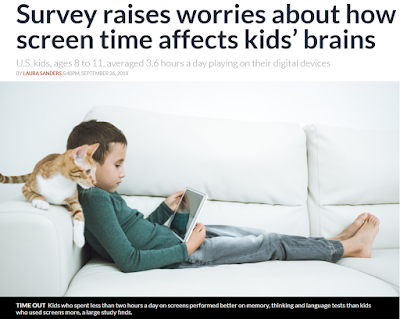Should We Worry About Our Children's Screen Time?
Earlier this month, this blog talked about the increased use of social media by teenagers in the United States over the past six years. A recent news article in Science adds to this concern. Citing a study published in the journal The Lancet: Child & Adolescent Health, ScienceNews reports that children 8-11 years old in the United States are now on average in front of a smart screen for 3.6 hours a day.
It is indeed a matter of concern if a large chunk of a child's waking hours are now spent in front of a screen. The study also shows that only 1 in 3 children aged 8-11 years uses the screen for less than two hours. Clearly, some other childhood activity is losing time. The report also looks at physical activity and only about 1 in 5 children in this age group perform the recommended 60 minute physical activity per day. On the sleep recommendation, at least half of the children are still able to sleep 9 to 11 hours per day. Homework has also disappeared in a significant number of elementary schools so screen time may be filling this void. In any case, what the child does with a screen is not addressed in the study so it is not known if a child is watching a video, browsing the internet, playing a game, reading an electronic book or doing other "fun" things during these screen times. The data also rely on self-reporting by parents.
A correlation is noted between the performance of a child on cognitive tests and the time a child spends on the screen. The study reports, "Global cognition was positively associated with each additional recommendation met (β=1·44, 95% CI 0·82–2·07, p<0·0001). Compared with meeting none of the recommendations, associations with superior global cognition were found in participants who met all three recommendations (β=3·89, 95% CI 1·43 to 6·34, p=0·0019), the screen time recommendation only (β=4·25, 2·50–6·01, p<0·0001), and both the screen time and the sleep recommendations (β=5·15, 3·56–6·74, p<0·0001)."
The sample this research considered is large, more than 4000 children across 20 sites in the United States. The results are preliminary since the work is still ongoing up till 2028. What has been collected so far are data from 2016 to 2017. What is worth raising at this point is that there is no corresponding trend seen in the Nation's Report Card, as provided by the reading and math scores of Grade IV students, children who will easily fit the age group covered by the study.
To understand this, perhaps, a word of advice published by the article in ScienceNews from a pediatrician who is reacting to this study is likewise worth our attention:
 |
| Above copied from ScienceNews |
It is indeed a matter of concern if a large chunk of a child's waking hours are now spent in front of a screen. The study also shows that only 1 in 3 children aged 8-11 years uses the screen for less than two hours. Clearly, some other childhood activity is losing time. The report also looks at physical activity and only about 1 in 5 children in this age group perform the recommended 60 minute physical activity per day. On the sleep recommendation, at least half of the children are still able to sleep 9 to 11 hours per day. Homework has also disappeared in a significant number of elementary schools so screen time may be filling this void. In any case, what the child does with a screen is not addressed in the study so it is not known if a child is watching a video, browsing the internet, playing a game, reading an electronic book or doing other "fun" things during these screen times. The data also rely on self-reporting by parents.
A correlation is noted between the performance of a child on cognitive tests and the time a child spends on the screen. The study reports, "Global cognition was positively associated with each additional recommendation met (β=1·44, 95% CI 0·82–2·07, p<0·0001). Compared with meeting none of the recommendations, associations with superior global cognition were found in participants who met all three recommendations (β=3·89, 95% CI 1·43 to 6·34, p=0·0019), the screen time recommendation only (β=4·25, 2·50–6·01, p<0·0001), and both the screen time and the sleep recommendations (β=5·15, 3·56–6·74, p<0·0001)."
The sample this research considered is large, more than 4000 children across 20 sites in the United States. The results are preliminary since the work is still ongoing up till 2028. What has been collected so far are data from 2016 to 2017. What is worth raising at this point is that there is no corresponding trend seen in the Nation's Report Card, as provided by the reading and math scores of Grade IV students, children who will easily fit the age group covered by the study.
 |
| Above copied from NAEP |
To understand this, perhaps, a word of advice published by the article in ScienceNews from a pediatrician who is reacting to this study is likewise worth our attention:
The study can’t say whether screen time — or the resulting absence of other activity — lowered thinking skills in children. “You don’t know which is the chicken and which is the egg here,” cautions pediatrician Michael Rich of Boston Children’s Hospital. It could be that smarter kids are less likely to spend lots of time on screens, he says.
Looking for clear-cut blame is a bit of a “red herring,” Rich says. Simple cause-and-effect relationships often don’t exist in human behavior and development. Instead of blanket pronouncements, “we need to tailor what we learn from science to individual children.”
Comments
Post a Comment